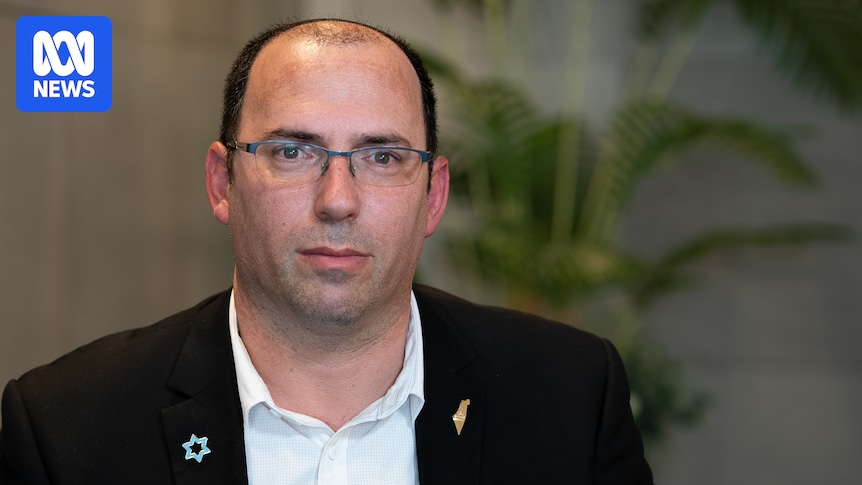Far-right Israeli politician Simcha Rothman has told the ABC that Australia needs to “decide to be on the side of Hamas … or Israel”, in the wake of his visa being cancelled and Israel’s decision to revoke visas for Australia’s representatives to the Palestinian Authority (PA).
The visa cancellations are the clearest sign of building tensions between Australia and Israel, after Australian Prime Minister Anthony Albanese announced that Australia would recognise a Palestinian state at next month’s UN General Assembly.
The visa revocation for Australia’s representatives to the Palestinian Authority comes partially in retaliation to Australia’s decision to cancel Mr Rothman’s visa for an upcoming series of appearances at Australian synagogues and Jewish schools, hosted by the Australian Jewish Association (AJA).
Late on Monday evening, Israel’s Foreign Minister Gideon Sa’ar, said his decision followed a “backdrop” of Australia’s decision to recognise a Palestinian state and the “unjustified refusal” to grant Mr Rothman’s visa — claiming the Australian government was choosing to fuel antisemitism.
Israeli Foreign Minister Gideon Sa’ar said the decision was in response to the Albanese government’s decision to recognise Palestinian statehood. (ABC News: Haidarr Jones)
Australia’s Foreign Minister Penny Wong has called it an “unjustified reaction, following Australia’s decision to recognise Palestine”.
“At a time when dialogue and diplomacy are needed more than ever, the Netanyahu government is isolating Israel and undermining international efforts towards peace and a two-state solution,” Senator Wong said in a statement.
“We will continue to work with partners as we contribute international momentum to a two-state solution, a ceasefire in Gaza and release of the hostages.
“The Australian government will always take decisive action against antisemitism.”
Australia’s decision to recognise Palestine is not just symbolic
In a statement, the Palestinian Authority’s foreign affairs ministry said it condemned “in the strongest terms the arbitrary measure”.
“The ministry considers this measure illegal and in violation of the Geneva Conventions, international law, and United Nations resolutions, which do not grant the occupying power such authority,” it said.
“It stresses that such actions reflect Israeli arrogance and a state of political imbalance, and will only strengthen Australia’s and other countries’ determination to uphold international law, the two-state solution, and recognition of the State of Palestine as the path to peace.”
In an interview with the ABC, Mr Rothman said Mr Sa’ar’s decision is a “great response”.
“I think the government of Australia needs to decide, do they want to be on the side of Hamas, or do they want to be on the side of Israel?”
‘Risk to the good order of the Australian community’
The ABC has seen the letter revoking Mr Rothman’s visa, which said he had the potential to use the events he would be participating in to “promote his controversial views and ideologies, which may lead to fostering division in the community”.
The letter cites examples of Mr Rothman claiming that children were not dying of hunger in Gaza, that those children were Israel’s enemies, and that the idea of a two-state solution had “poisoned the minds of the entire world”.
The decision states that “his presence in Australia would or might be a risk to the good order of the Australian community or a segment of the Australian community, namely the Islamic population”.
It added that “given his inflammatory statements, that likely public knowledge that [Mr Rothman] had entered Australia with the government’s permission may encourage others to feel emboldened to voice any anti-Islamic sentiments, if not to take action to give effect to that prejudice.”
The letter revoking the visa cited inflammatory statements made by Simcha Rothman. (AFP: Gil Cohen-Magen)
But Mr Rothman insisted he was being blocked from entering Australia only because he said, “Hamas is bad, and Israel is good.”
When asked if Mr Rothman conceded his views and voting record was at odds with Australia’s foreign policy, he said he felt the Australian government was “afraid of open discourse about its policies”.
“That’s usually defining dictatorships,” he said.
“… It’s not a democratic way to go and that’s why, despite the fact that the Australian government is so afraid of hate and division, they allowed people to shout on the streets calls for genocide of the Jewish people.”
Far-right views on Israel-Palestine
In a tense interview with the ABC, Mr Rothman repeatedly denied there was a starvation crisis in Gaza, blaming Hamas for any hunger, and repeated claims published in a conservative American news website that the United Nations had changed the definition of starvation to launch political attacks against Israel.
He also denied US President Donald Trump had said starvation was present, despite the US president’s repeated references to the scenes of desperation in Gaza being hard to “fake”.
Mr Rothman is a member of the National Religious Party — Religious Zionism, which is led by Israeli Finance Minister Bezalel Smotritch.
The party leader has been sanctioned by Australia and other countries, including the UK, over accusations of inciting violence against Palestinians in the West Bank.
Israeli minister announces plans to ‘bury’ Palestinian state
Mr Rothman repeatedly corrected the ABC when asked questions about the West Bank, refusing to acknowledge that as its name and instead insisting it be called Judea and Samaria — its biblical name.
He also took issue with references to the Australian government using the term “Occupied Palestinian Territories” to describe the West Bank and Gaza.
Mr Rothman’s visa cancellation is not the first time Australia has denied entry to an Israeli politician.
Former justice minister Ayalet Shaked was denied a visa in November last year, with Home Affairs Minister Tony Burke saying it was “over concerns she would threaten social cohesion”.
The ABC understands Israel’s decision on Australia diplomatic visas may only affect two staff.

